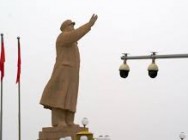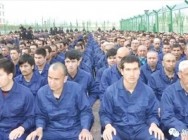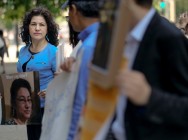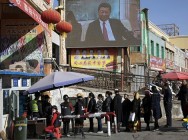Internment camps with up to a million prisoners. Empty neighborhoods. Students, musicians, athletes, and peaceful academics jailed. A massive high-tech surveillance state that monitors and judges every movement. The future of more than 10 million Uighurs, the members of China’s Turkic-speaking Muslim minority, is looking increasingly grim.
As the Chinese authorities continue a brutal crackdown in Xinjiang, the northwest region of China that’s home to the Uighur, Islam has been one of the main targets. Major mosques in the major cities of Kashgar and Urumqi now stand empty. Prisoners in the camps are told to renounce God and embrace the Chinese Communist Party. Prayers, religious education, and the Ramadan fast are increasingly restricted or banned. Even in the rest of China, Arabic text is being stripped from public buildings, and Islamophobia is being tacitly encouraged by party authorities.

Trump Blinks, and Egypt’s Sisi Wins
By giving in on aid, Washington just lost its leverage in Cairo.
But amid this state-backed campaign against their religious brethren, Muslim leaders and communities around the world stand silent. While the fate of the Palestinians stirs rage and resistance throughout the Islamic world, and millions stood up to condemn the persecution of the Rohingya, there’s been hardly a sound on behalf of the Uighur. No Muslim nation’s head of state has made a public statement in support of the Uighurs this decade. Politicians and many religious leaders who claim to speak for the faith are silent in the face of China’s political and economic power.
“One of our primary barriers has been a definite lack of attention from Muslim-majority states,” said Peter Irwin, a project manager at the World Uyghur Congress. This isn’t out of ignorance. “It is very well documented,” said Omer Kanat, the director of the Uyghur Human Rights Project. “The Muslim-majority countries governments know what’s happening in East Turkestan,” he said, using the Uighur term for the region.
Many Muslim governments have strengthened their relationship with China or even gone out of their way to support China’s persecution. Last summer, Egypt deported several ethnic Uighurs back to China, where they faced near-certain jail time and, potentially, death, to little protest. This followed similar moves by Malaysia and Pakistan in 2011.
This is in stark contrast to how these countries react to news of prejudice against Muslims by the West or, especially, Israel. Events in Gaza have sparked protests across the Islamic world, not only in the Middle East but also in more distant Bangladesh and Indonesia. If Egypt or Malaysia had deported Palestinians to Israeli prisons, the uproar would likely have been ferocious. But the brutal, and expressly anti-religious, persecution of Uighurs prompts no response, even as the campaign spreads to the Uighur diaspora worldwide.
If Egypt or Malaysia had deported Palestinians to Israeli prisons, the uproar would likely have been ferocious. But the brutal, and expressly anti-religious, persecution of Uighurs prompts no response, even as the campaign spreads to the Uighur diaspora worldwide.
Part of the answer is that money talks. China has become a key trade partner of every Muslim-majority nation. Many are members of the Chinese-led Asian Infrastructure Investment Bank or are participating in China’s Belt and Road Initiative. In South Asia, this means infrastructure investment. In Southeast Asia, China is a key market for commodities such as palm oil and coal. The Middle East benefits due to China’s position as the world’s top importer of oil and its rapidly increasing use of natural gas.
“Many states in the Middle East are becoming more economically dependent on China,” said Simone van Nieuwenhuizen, a Chinese-Middle East relations expert at the University of Technology Sydney. “China’s geoeconomic strategy has resulted in political influence.”
“I don’t think there is a direct fear of retribution or fear of pressure,” said Dawn Murphy, a China-Middle East relations expert at Princeton University. “I do think that the elite of these various countries are weighing their interests, and they are making a decision that continuing to have positive relations with China is more important than bringing up these human rights issues.”
Xinjiang’s immediate neighbors, such as Pakistan, Afghanistan, and Kazakhstan, face a particularly difficult situation. The ongoing persecution has caught up some of their own citizens, or their families. But with both close economic and geopolitical ties to China, these countries are highly reluctant to speak up. Pakistan sees China as a vital balancer against India, and their relationship, sometimes referred to as the “iron brotherhood,” goes back decades.
But there are subtler reasons the Uighur are ignored. They are on the edge of the Muslim world, in contrast to the Palestinian cause, which is directly connected to the fate of one of Islam’s holiest cities, Jerusalem. China has little place in the cultural imagination of Islam, in contrast with Muslims’ fraught relationship with the idea of a Jewish state. Even as China’s presence in the Middle East grows, it lacks the looming presence of the United States or Israel.




















